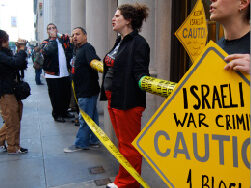

By Aaron Lakoff
The Israel/Palestine debate has been a controversial topic atConcordia in recent years. However, there is a point when discussion ona controversial issue can be used as a pretext for censorship andrepression. With recent political manoeuvring within and beyondConcordia around this issue, I fear that we may be moving in thatdirection.
The presidents of some 25 Canadian universities were invited toOttawa this week to testify at the Canadian Parliamentary Inquiry Intoanti-Semitism, an initiative of the Canadian Parliamentary Coalition toCombat anti-Semitism. Frederick Lowy, who was Concordia's presidentuntil 2005, testified on Nov. 24.
As a Jewish student at Concordia myself, some might find it odd thatI would oppose such a forum and the participation of personalities frommy university.
I would be in favour of the CPCCA if its purpose were to fight realanti-Semitism, but a closer examination shows us that this isdefinitely not the case. The CPCCA is merely a tool to stifle debate onIsraeli apartheid at Canadian university campuses and elsewhere.

Even after the foundation of Israel,anti-Zionism was not a particularly heretical position. Assimilated Reform Jewslike Rosenwald believed that Judaism should remain a matter of religious ratherthan political allegiance; the ultra-Orthodox saw Jewish statehood as animpious attempt to "push the hand of God"; and Marxist Jews -- mygrandparents among them -- tended to see Zionism, and all nationalisms, as adistraction from the more essential struggle between classes.
To be Jewish, I was raised to believe, meant understanding oneself as a memberof a tribe that over and over had been cast out, mistreated, slaughtered.Millenniums of oppression that preceded it did not entitle us to a homeland ora right to self-defense that superseded anyone else's. If they offered usanything exceptional, it was a perspective on oppression and an obligation bornof the prophetic tradition: to act on behalf of the oppressed and to cry out atthe oppressor.
For the last several decades, though, it has been all but impossible to cry outagainst the Israeli state without being smeared as an anti-Semite, or worse. Toquestion not just Israel'sactions, but the Zionist tenets on which the state is founded, has for too longbeen regarded an almost unspeakable blasphemy.

Inthe long tradition of Jewish working class involvement in and supportfor liberation struggles, IJAN-Labor stands in solidarity with the HighFollow-up Committee for the Arab Citizens of Israel, the NationalCommittee of Local Authorities, and all parties, movements andinstitutions of Palestinian civil society in Israel, who have called ageneral strike for today, October 1, 2009.
This strike marks the ninth anniversary of the Jerusalemand Al Aqsa Day in October 2000 when Israeli authorities massacred 13Palestinian protesters. The killers have never been brought to justice.
IJAN-Laboralso welcomes the Trades Union Congress (U.K.) resolution of 17September, which endorses the growing movement for Boycott, Divestmentand Sanctions (BDS) against Israeli apartheid, and calls forreconsideration of the TUC's relationship with the Histadrut, theZionist labor federation whose latest crime was to support Israel's attacks on Gaza.

CONTACT
FOLLOW US
SUBSCRIBE TO OUR NEWSLETTER
BUSINESS OF BACKLASH
Click here to download the 120-report which exposes the funders of Zionist backlash on campuses and in communities
SEARCH THE SITE
NAVIGATION
WHO WE ARE
NEWS & OPINIONS
PROJECTS & CAMPAIGNS
CHAPTERS & SECTORS
RESOURCES
GET INVOLVED

